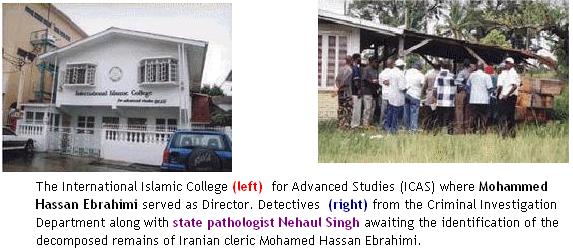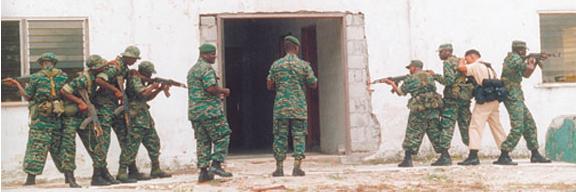Police spokesman John Sauers yesterday said
police
discovered
Ebrahimi's
body on Tuesday evening in a
shallow grave four hundred yards off the St.
Cuthbert's trail and about three and a half
miles from the Linden-Soesdyke Highway.
Diplomat_kidnapped armed-bandits-grab.
According to Sauers, the partly
decomposed body was positioned face down in
the three feet deep grave. His mouth was
covered with duct tape which was also used
to bind his feet as well as his hands, which
were behind his back. The body was also
outfitted in the same clothes Ebrahimi was
wearing when he was last seen alive.

(Ken
Moore photos)
There were two gunshot wounds to the
head, which was decomposed to such an extent
that the skull was clearly visible along
with the entry and exit wounds of the
bullets.
It is believed that one of the bullets
entered the right side of his face and
exited through the top of his skull, while
the other was fired at the left side and
exited through one of his eyes.
"I will take the liberty to
represent that that is the body of Hassan
Ebrahimi," Abdul
Kadir told reporters after he and
a close family friend identified the body at
the Le Repentir Mortuary yesterday morning.
Because of the advanced stage of
decomposition his body was stored at the
mortuary, where the identification was done.
Kadir confirmed the description of the
body that was detailed by the police and
based on what he had observed he estimated
that it may have been buried for about two
or three weeks, though he did admit his was
a technically uninformed opinion. This
opinion would also suggest that the cleric
was alive for around a week following his
kidnapping.
Kadir noted that police still have to
determine a motive, though he said he
imagines they did their best.
"The police's ability to solve
crimes is dependent on the resources at
their disposal and willingness to solve
crimes... in the Guyana context, I would
like to think that the police did their
best," he said before he was joined by
the uncle of Ebrahimi's pregnant wife, who
is due to deliver any day now. Several
appeals by relatives of the man were made in
the local press for his release.
Iranian
Foreign Minister Kamal Kharrazi recently
voiced concern over the kidnapping and had
called on officials here to work quickly to
secure his release.
"We want the necessary action to be
taken to release him as soon as possible and
for the abductors to be prosecuted,"
the minister was quoted as saying by IRNA
news agency. Following this statement, the
Iranian Ambassador to Venezuela and several
investigators travelled to Georgetown and
had meetings with the Minister of Foreign
Affairs Rudy Insanally and other officials.
Kadir said it is possible that Guyana
could soon be revisited by Iranian police.
On the night of the
kidnapping, Ebrahimi had been asked by an
official of the college to return there
because of a water leak. This appeared to be
a ruse to get him to return to the facility
as no water leak was ever found. In the
professionally-executed kidnapping, the
vehicle Ebrahimi was to travel in was
disabled by gunfire and another official
travelling with him was shot in the foot.
The police - including elements of a new
anti-kidnapping unit - could find no trace
of the cleric and the absence of a ransom
demand has led to widespread speculation
about the reasons for the abduction.
Questions have also been raised over why
Guyana was chosen for the site of the
college.
During the police investigations, a local
muslim school was controversially raided but
no sign of the cleric was found.
Meanwhile, the interim head of the
college Sheikh Salim Ibn Abdul Kadir would
not pronounce on the future of the
institution, which issue he says does not
take precedence at this time







